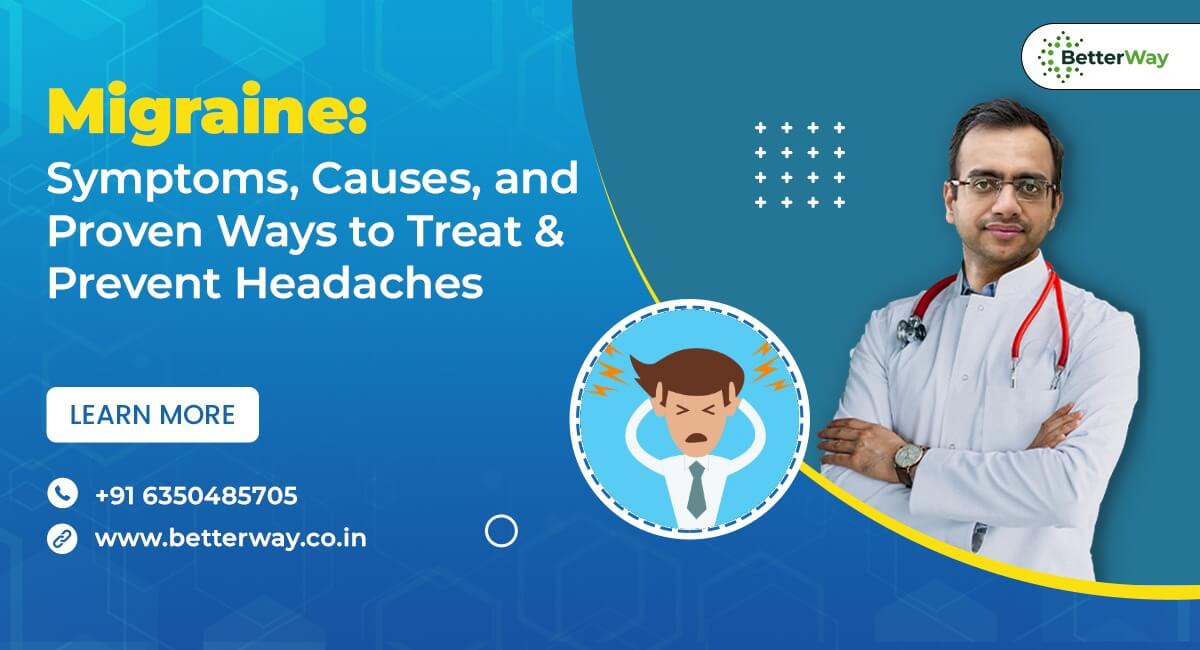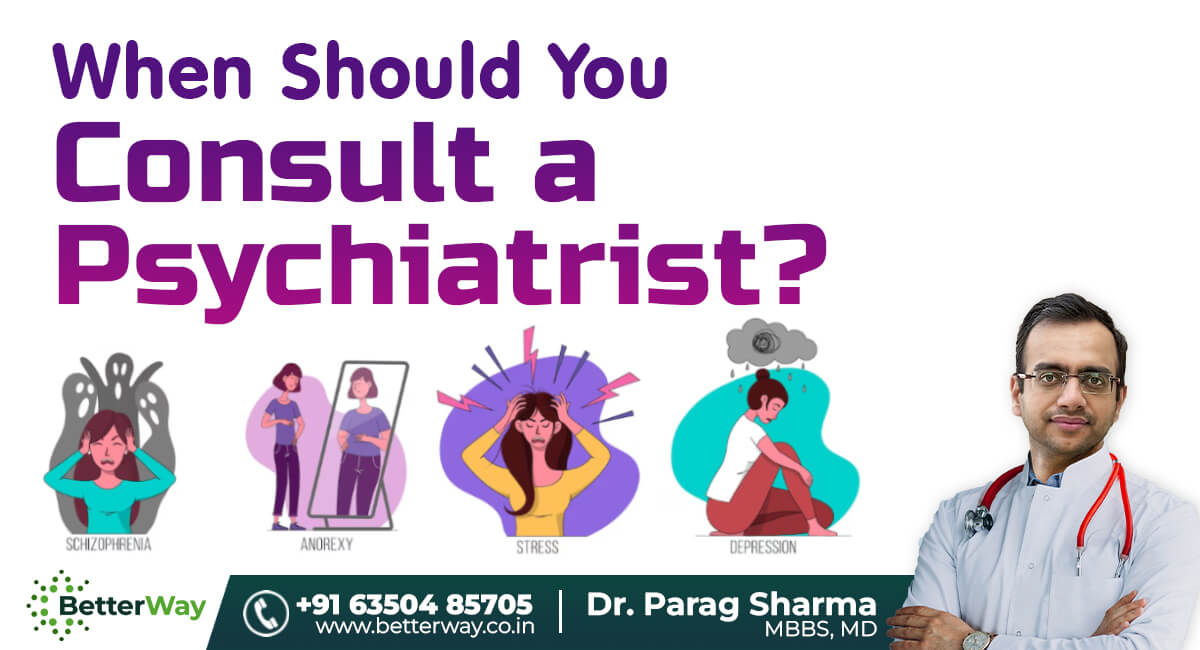Headache Specialist in Mohali: Effective Migraine Treatment at BetterWay Clinic
Recurring headaches can disrupt your work, relationships, and mental peace. If you’re tired of suffering and looking for expert help, you might need a headache specialist in Mohali. Migraines are more than just headaches — they’re a complex neurological disorder that affects millions of people globally.
At BetterWay Clinic, Mohali, Dr. Parag Sharma (MD Psychiatry, Certified Sexologist) provides personalized, advanced care to help you manage and prevent migraines — so you can live pain-free.
What Is a Migraine?
A migraine is a neurological condition marked by intense, throbbing pain, typically on one side of the head. Unlike a regular headache, migraine episodes can last anywhere from 4 to 72 hours and are often accompanied by:
Nausea or vomiting
Sensitivity to light, sound, or smell
Visual disturbances (aura)
Difficulty concentrating
Migraines can severely impact your quality of life — but with timely migraine treatment in Mohali, you can take control.
What Does a Migraine Feel Like?
Migraine pain is often described as:
Pulsating or pounding
Starting on one side and possibly shifting
Triggering discomfort in the neck, jaw, or eyes
You may also feel:
Nausea and stomach upset
Dizziness or brain fog
Extreme tiredness
Visual auras like flashing lights or zigzag patterns
Common Migraine Symptoms
One-sided or bilateral head pain
Sensitivity to light, sound, or smells
Nausea and vomiting
Aura (in about 25% of cases)
Difficulty speaking or concentrating
Eye or facial pain
If these symptoms sound familiar, consult a headache specialist in Mohali for a proper diagnosis.
What Is Migraine Aura?
Migraine aura is a group of warning signs that appear before or during a migraine. These can include:
Visual effects (flashes, blind spots, zigzag lines)
Pins and needles in limbs
Ringing in the ears (tinnitus)
Difficulty speaking
Muscle weakness or dizziness
Aura typically lasts less than an hour and signals that a migraine is about to begin.
What Causes Migraine?
Migraines are triggered by abnormal brain activity, not just changes in blood vessels. Key factors include:
Imbalance in brain chemicals like serotonin and CGRP
Neurogenic inflammation
Overactive trigeminal nerves
Cortical spreading depression (linked to aura)
These factors cause inflammation and nerve sensitivity, resulting in the severe pain and neurological symptoms of migraine.
Common Migraine Triggers
Everyone’s triggers are different, but the most common include:
Stress or anxiety
Hormonal shifts (menstruation, menopause)
Sleep issues or oversleeping
Strong lights, smells, or sounds
Fasting or skipping meals
Caffeine, alcohol, or smoking
Weather changes
Certain medications

Home Remedies for Migraine Relief
Mild migraine attacks can sometimes be managed at home. Here are expert-recommended steps:
Rest in a dark, quiet room
Apply a cold compress to your forehead or neck
Stay hydrated – drink water regularly
Take over-the-counter painkillers (with doctor’s advice)
Try gentle head/neck massage
Limit screen time and avoid strong odors
Sleep or take a nap if possible
A small cup of coffee can help in early stages (but avoid excess)

How to Prevent Migraine Long-Term
There’s no permanent cure for migraines, but they can be controlled and prevented through lifestyle changes and preventive care. Here’s how:
 Sleep Hygiene
Sleep Hygiene
Stick to a fixed sleep schedule
Avoid late-night screens, heavy meals, and caffeine
 Balanced Diet
Balanced Diet
Eat on time
Avoid known food triggers (like cheese, chocolate, processed meats)
Keep a food and symptom journal
 Regular Exercise
Regular Exercise
Low-impact workouts like walking, swimming, and yoga
Avoid overexertion
 Stress Management
Stress Management
Practice meditation, breathing exercises, and journaling
Take short breaks throughout the day
Make time for hobbies
 Behavioral Therapy
Behavioral Therapy
CBT (Cognitive Behavioral Therapy) helps reduce anxiety and sensitivity to triggers
Therapy can also treat related conditions like stress and depression
Why Keep a Migraine Diary?
A migraine diary can help you and your doctor better understand your condition. Log:
Time and duration of migraine
Possible triggers (food, stress, sleep issues)
Symptoms and severity
Medications used and effectiveness
This information allows your headache specialist in Mohali to tailor your treatment plan.
Why Choose Dr. Parag Sharma for Migraine Treatment in Mohali?
At BetterWay Clinic, Dr. Parag Sharma offers integrated care for migraine relief, combining psychiatric expertise with neurobiological insight. His patient-first approach focuses on both treatment and prevention, ensuring you get long-term relief.
You’ll benefit from:
-
Comprehensive migraine diagnosis
-
Evidence-based medication therapy
-
Lifestyle and stress counseling
-
Hormonal and neurological assessments
-
Support for anxiety, depression, or sleep disorders



Final Word
Don’t let migraine take over your life. With expert guidance, you can reduce attacks, manage triggers, and live fully again. If you’re searching for an experienced headache specialist in Mohali or need advanced migraine treatment in Mohali, Dr. Parag Sharma at BetterWay Clinic is here to help.
FAQs:
Q1. Who is the best headache specialist in Mohali?
A: Dr. Parag Sharma at BetterWay Clinic is a leading headache and migraine specialist in Mohali, offering evidence-based, personalized treatment plans.
Q2. What are the most common migraine symptoms?
A: Common migraine symptoms include one-sided throbbing pain, nausea, vomiting, sensitivity to light or sound, and visual aura.
Q3. How is migraine different from a regular headache?
A: Unlike regular headaches, migraines are a neurological disorder that often includes severe pain, nausea, aura, and light/sound sensitivity lasting 4–72 hours.
Q4. Can migraine be permanently cured?
A: While migraines can’t be permanently cured, they can be effectively managed with medication, lifestyle changes, and preventive care from a specialist.
Q5. What triggers migraine headaches?
A: Triggers include stress, sleep disturbances, hormonal changes, caffeine, fasting, strong smells, and weather changes. Keeping a migraine diary can help identify yours.





